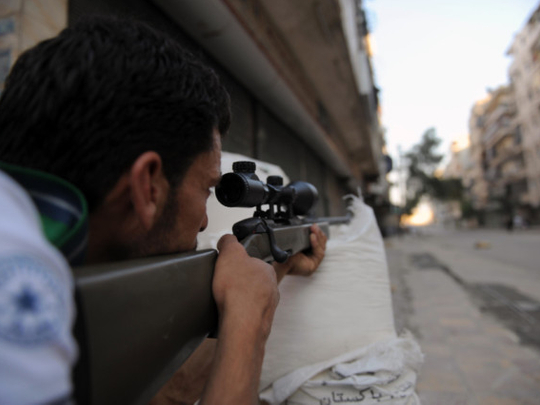
Beirut: It took 17 months but Aleppo, Syria’s second largest city, is revolting and now has Bashar Al Assad’s undivided attention.
While, regime forces were busy clamping down on advances from the Free Syrian Army in Homs, Hama, Deir Al Zour and Douma, there was little indictation that Aleppo would rise. It seems that the tides have turned now with the fiercest battles unfolding the past two weeks.
A combination of the Syrian Army’s fatigue and an awakening on the part of Aleppo’s business elite are reasons for this shift. Although Syrian government forces enjoy overwhelming military superiority, with at least 100 tanks, dozens of attack helicopters, 400 troop carriers and armoured vehicles, as well as busloads of Shabiha militias concentrating in Aleppo — the July 18 bombing of a Damascus government intelligence hub that killed four generals highlighted that the army was stretched thin and morale is low and sinking fast.
Despite Foreign Minister Waleed Al Muallem’s claims in Tehran that the Syrian army would prevail, Free Syrian Army (FSA) troops gained control of at least eight sections of Aleppo, nestled in a crescent-shaped area that extended from the east to the south. Damascus, aware that an FSA victory in Aleppo assured a collapse of the regime, is fighting with all its energies. Now Aleppo and Damascus have become theatres of bloody confrontations even as clashes continue in Dara’a, Qamishli, Deir Al Zor, Rastan, Homs, Hamah and many other cities and villages.
The pressure increased on the Syrian Army, especially after Brigadier General Manaf Tlass, the former commander of an elite Republican Guard unit, confirmed his defection and called on soldiers to defect to the FSA. Also, Abdul Basit Sida, the chairman of the Syrian National Council understood that the FSA required better and more sophisticated weapons to defeat the Al Assad’s forces. “We want weapons that would stop tanks and jet fighters,” he said in Abu Dhabi on Saturday. But its also important to highlight the fatigue of the business elite in Aleppo.
Over the course of the conflict they remained “loyal” to the regime, but the longer the conflict dragged on, the less confidence they had in the regime to quell the rebellion, and using their business-oriented judgement began looking for commercial alternatives. Many joined their Damascus counterparts in shifting significant business interests out of Syria. Indeed, businesses were at the receiving end of the wholesale destruction throughout the country, as industrial production, commerce, and nearly the entire agricultural production, came to a standstill.











